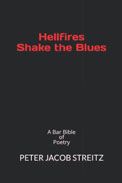
 |
a constipated
ass-wipe
like that Suit
in the crosswalk.
Look at the poor bastard.
Probably escapes
Pleasantville
every morning
like his tits
are on fire…"
This collection by Streitz is the first of four Bar Bibles of Poetry authored by him. In this volume, his attention falls on subjects ranging from bartenders to civil rights leaders, E.D. to selfies. Several poems deal with sex and love, from the lofty heights of romanticism to the street level of strippers and masturbation. He spends time on drunk writers hiding in their homes, dancers who should have been writers, beetles rolling balls of dung, and fathers who find themselves protective and uncomfortable.
Stylistically, there are several clear, persistent influences on Streitz’s work. In terms of genre, the work is characterized by a mix of Beat writers, dirty realism, and bebop. Individually, the reader will see signs of Langston Hughes in terms of style, syntax, and line length. Like Hughes often did, Streitz utilizes extremely short lines, often with dashes, and shows the influence of jazz through the quick rhymes and slant rhymes nestled among short rhythmic sections, which change as quickly as they are established. Hughes' poem, “Harlem,” is a great example of the style of writing one will see in this book: “Does it stink like rotten meat? / Or crust and sugar over-- / like a syrupy sweet?”
Second to Hughes, the beat writers, in particular Jack Kerouac, impact Streitz’s style. Not only does he often focus on similar, street-level subjects, but Streitz sometimes employs a bit of the stream-of-consciousness style found in much of Kerouac’s writings. Additionally, there are notes of Ginsberg here, as well, in the sense that neither poet tends to shy away from the dirty and grimy seen in the world and themselves.
However, the most influential and the best indicator of what one can expect from Streitz is the work of Charles Bukowski. A reader familiar with The Roominghouse Madrigals or Burning in Water Drowning in Flame will find immediate familiarity with both Streitz’s poetic voice and the way he picks and deals with his subject material. Each attempts to take the sordid and ugly that they see or imagine and write it realistically while still finding some kind of beauty or solace in the scene. One quick example is when Bukowski talks about “grey and beastly” things coming to end the world in the poem “The End” and states, “and we sit in the window / and watch, strangely / happy, we have 14 cigarettes / and a bottle of wine. / enough to last / until they / find us.” Streitz's quote accompanying this review is a great example, and the most fitting, of his work mirroring the tone and approach of Bukowski. Both show a disdain for the rat race and recognize what Palahniuk stated so well in Fight Club, “The things you own end up owning you. It’s only after you lose everything that you’re free to do anything.”
Streitz’s poems are very concise and quick to read. They aren’t meant to be obscure or lofty but to be understood by the laborer on the street or the disgruntled clerk. Interestingly, many aren’t as personal as the reader may initially expect. However, several of these poems are tough and finely executed. Readers who are familiar with this style and want to branch out, particularly in poems with more modern accouterments, will find this volume an entertaining addition to their interests.
Streitz's No Words... Just News was a 2024 Eric Hoffer Book Award Category Finalist.